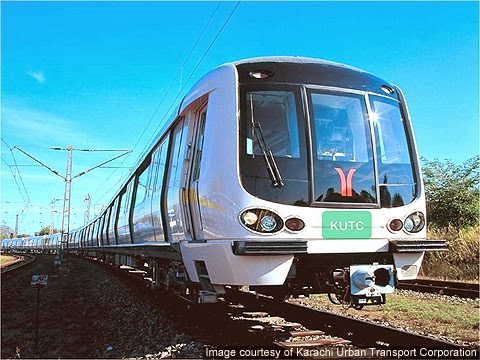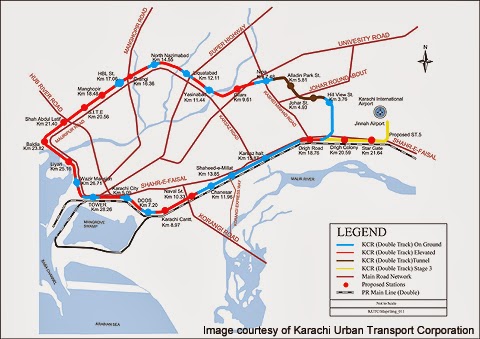PakAlumni Worldwide: The Global Social Network
The Global Social Network
Japan Agrees to Finance and Build Modern Mass Transit System in Karachi
Pakistan's federal government and Sindh provincial government are close to a deal with Japan International Cooperation Agency (JICA) to finance a modern mass transit system befitting the megacity of Karachi with a population of nearly 20 million, according to a Pakistani TV Channel.
 |
| KUTC Trains Source: KUTC |
The mass transit project will feature modern trains with automatic signalling and telecommunication system. An automatic train control (ATC) system will be set up. The train stations will feature computerized ticketing and vending machines, automated ticket gates and elevators. It will be run by Karachi Urban Transport Corporation (KUTC).
Project History:
The $2.5 billion project will revitalize and modernize the Karachi Circular Railway (KCR). Opened in 1964, the old KCR ran from Drigh Road in the outskirts to the center of the city of Karachi. It ceased operations in 1999 after it suffered huge losses.
Efforts to revive it began in 2005 with a feasibility study conducted by Japan External Trade Organisation (JETRO) completed in 2006. UK-based Scott Wilson Railways was appointed to validate the report prepared by JETRO.
Japan International Co-operation Agency (JICA), which is funding the project, sponsored a final study prepared by Special Assistance for Project Formulation (SAPROF). US-based consultants Louis Berger validated the final report. The progress has so far been slow and halting but it now appears that the new government of Prime Minister Nawaz Sharif is pushing to make it happen.
Project Scope:
The JETRO study has recommended that the project be done in two phases.
Phase I of the project will include a 28.3 km circular section from Karachi Cantonment to a proposed station at Gulistan-e-Johar. About 9 km of this section will be elevated.
Phase II will consist of the 14.8km circular section from Gulistan-e-Johar to the proposed station at Liaquatabad. This section will have two dedicated tracks along the main line. Phase II also includes a 5.9 km airport line from Drigh Road to Jinnah International Airport. This extension will either have an elevated or underground track. Other bridges, culverts and underpasses, wherever necessary, will be constructed for the project.
Project Funding:
Japan International Co-operation Agency (JICA) is providing the entire funding for the project through a soft loan. The loan is payable in 40 years by the stakeholders of the City District Government Karachi, Pakistan Railways and Government of Sindh. The Karachi Urban Transport Corporation (KUTC) is planning an international tendering process for the project, which will be awarded on a turnkey basis. The winning contractors will operate it for the first two years of operation.
Rolling Stock:
The new KCR will be served by electric multiple units (EMU) with a capacity to carry 1,400 passengers. The maximum speed of the EMUs will be 100 km/h. About 290 trains are expected to operate daily at six-minute intervals.
Infrastructure Construction:
 |
| Proposed Station Design |
The project will include the construction of 19 underpasses and three overhead bridges.
About 23 stations are planned for the project. The stations will feature computerized ticketing and vending machines, automated ticket gates and elevators.
The existing KCR has about 22 level crossings. Since the railway line passes through the major commercial areas of the city, these level crossings need to be removed to ensure that trains can operate every 6 minutes. The level crossings are expected to be removed and replaced by underpasses or overpasses.
Economic Impact:
There will be significant positive economic impact of this megaproject. In addition to its obvious benefits for the businesses owned by Prime Minister Nawaz Sharif's family, there will be thousands of new jobs created for ordinary Pakistanis during construction and later to operate the system. It will help stimulate Pakistan's stalling economy.
Japan's Interest:
Japan's commercial interest in Pakistan has recently been validated by JETRO survey of Japanese companies doing business in the country. It indicated that Japanese companies have "strong intentions to expand their business for the reasons of “sales increase” and “high growth potential.” in Pakistan. Clearly, the Japanese see significant future potential in Pakistan to increase their economic footprint in the emerging growth market.
Current Status:
The city and the provincial governments have already begun to remove squatters in and around the existing KCR track to begin new construction. Each of the estimated 5,000 affected families is being promised an 80-square-yard newly built home. The Japan International Cooperation Agency (JICA) is providing financial assistance for the resettlement project, while the KUTC will give an additional Rs 50,000 in financial aid to each affected family, according to a news report.
Future Concerns:
One of the key concerns is how will the system be managed after the first two years of operation by the turn-key contractors? Will it suffer the same horrible fate as the previous public transport systems have in Karachi? Will it be used to hire political cronies of the ruling politicians? Will it be headed by incompetent and corrupt managers hand-picked by politicians? If the politicians are serious about ensuring a well-run mass transit system in Karachi, they will need to take a page from the Delhi Metro Rail Corp (DMRC) system in India. It is being run very well by an independent professional management team without political interference in its day to day hiring, firing and other management decisions.
Summary:
It is certainly welcome news that Karachi, the world's fastest growing megacity, will finally have a mass transit system that its residents need and deserve. Let's hope this time it's for real.
Related Links:
Haq's Musings
Saving PIA, Railway and Education
Politics of Patronage in Pakistan
Incompetence Worse Than Corruption in Pakistan
JETRO 2013 Survey of Pakistan
Pakistan on Goldman's Growth Map
Karachi is World's Fastest Growing Megacity
-
Comment by Riaz Haq on August 30, 2023 at 6:12pm
-
Cable cars: An economically viable public transport system in #AmLat cities?
https://blogs.worldbank.org/latinamerica/cable-cars-economically-vi...
Did you know that in 2004 in Colombia, the Mayor's Office of Medellín inaugurated "Metrocable", the first cable car in Latin America (and the world) that functioned as a means of urban transportation?
Metrocable, in addition to connecting the marginal hillside neighborhoods of Comuna 13 with the city's metro system, demonstrated that cable car technology was viable as a mode of transport in mountainous or hillside urban areas, for distances of up to five kilometers. In the Latin American context, cable car helps vulnerable and predominantly low-income populations living in such sites, improving their urban conditions, and increasing access to job opportunities and other growth opportunities. Following the successful case of Medellín, in several cities around the world this solution was implemented.
The relatively low cost of construction, ranging from US$19 million per kilometer, in cities such as Medellín and Mexico City, to US$32 million in Guayaquil, and its rapid implementation (for example, the 4.1 kilometer Guayaquil cable car took 24 months to complete) have led more than 18 cities, mostly in emerging economies, to opt for implementing cable car systems within their urban transport infrastructure.
In addition to the advantages in terms of mobility, urban cable cars do not take up large surfaces, enabling public entities to provide and improve urban facilities. This generates socio-economic benefits in addition to those attributable to a transport project.
Why choosing this solution?
In the last years, public authorities and private actors have tried to understand business models used for this solution and variables that affect their success.
Faced with a growing interest to implement this system, the World Bank published in 2020 the study "Urban Aerial Cable Cars as Mass Transit Systems. Case studies, technical specifications, and business models". This is the first publication that brings together objective data on 21 urban cable cars projects, both in Latin America and other countries around the world, and includes a description of the main characteristics of the infrastructure, travel demand, and the business model adopted for their construction and operation.
The (World) Bank's analysis documented the cable car-gondolas technology systems, their relatively low implementation complexity, and found that the equipment supplier market (cabins and electromechanical equipment) is dominated by a limited number of European manufacturers.
Given this particularity of the supplier market, the Bank's analysis suggests that a decisive element for the success of these projects lies in the choice of the business model used for both construction and operation. Reviewing the inventory of modern urban ropeways, we found the following business models:
1. The Public works model, which is put out to tender the execution of works, with state operation and maintenance.
The La Paz and Medellín systems are in this category. La Paz has the most extensive urban cable network in the world, with 10 lines, more than 30 kilometers of extension, and an average of 160 thousand passengers per day. Medellín, on the other hand, has a network of 5 lines with about 12 kilometers of extension, and 40 thousand passengers per day.
2. In the PPP - public-private partnership – model, the concession for the service’s construction, operation, and maintenance are in charge of a private entity.
Comment
- ‹ Previous
- 1
- 2
- 3
- Next ›
Twitter Feed
Live Traffic Feed
Sponsored Links
South Asia Investor Review
Investor Information Blog
Haq's Musings
Riaz Haq's Current Affairs Blog
Please Bookmark This Page!
Blog Posts
India's Modi Brags About Ordering Transnational Assassinations
In a campaign speech on May 1, Indian Prime Minister Narendra Modi bragged about his campaign of transnational assassinations of individuals he has labeled "terrorists". “Today, India doesn't send dossiers to the masters of terrorism, but gives them a dose and kills them on their home turf", he is reported to have said, according to a tweet posted by his BJP party. Last…
ContinuePosted by Riaz Haq on May 3, 2024 at 5:09pm — 2 Comments
Pakistanis' Insatiable Appetite For Smartphones
Samsung is seeing strong demand for its locally assembled Galaxy S24 smartphones and tablets in Pakistan, according to Bloomberg. The company said it is struggling to meet demand. Pakistan’s mobile phone industry produced 21 million handsets while its smartphone imports surged over 100% in the last fiscal year, according to …
ContinuePosted by Riaz Haq on April 26, 2024 at 7:09pm
© 2024 Created by Riaz Haq.
Powered by
![]()

You need to be a member of PakAlumni Worldwide: The Global Social Network to add comments!
Join PakAlumni Worldwide: The Global Social Network